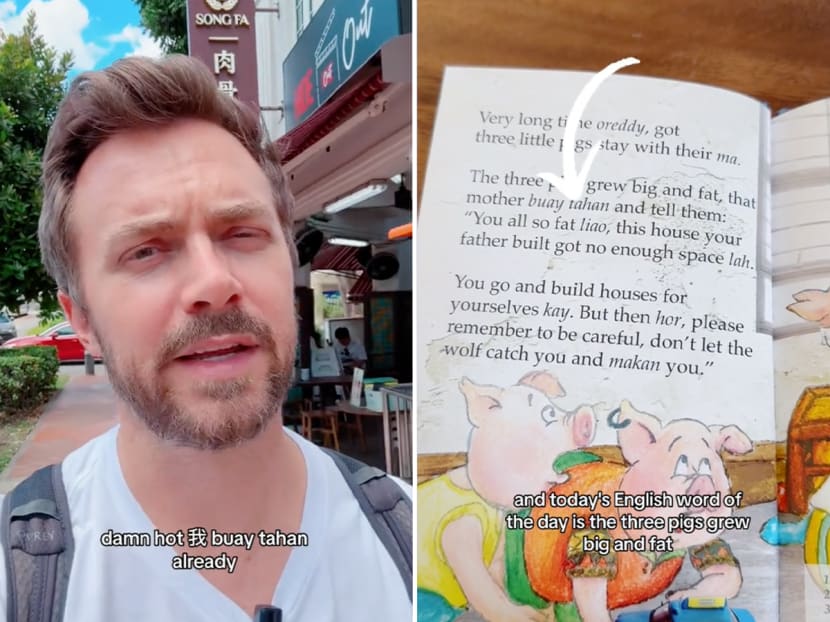#trending: 'We buay tahan how good you are' — American in S'pore earns praise for nailing Singlish

American TikTok content creator, Zenos Schmickrath, has gained online attention for exploring the world of Singlish in his TikTok videos.
SINGAPORE — American Zenos Schmickrath is on a mission to learn and make sense of Singlish, and he is bringing the internet along for a ride with him.
Mr Schmickrath, who has been living in Singapore for 12 years, has been learning Singlish since 2021, according to his TikTok videos.
His recent videos, where he explores a different Singlish word in every video, have gained traction among netizens.
In one video, he learns the Singlish word “buay tahan” through a Singlish adaptation of The Three Little Pigs by artist Casey Chen.
“‘Buay tahan’ means cannot stand it anymore,” he said, referring to the definition stated in the storybook. “It says ‘resistant’ here but I think it has a deeper meaning.”
Subsequently, he began to apply the use of the commonly used local Hokkein phrase.
“Walao eh, today damn hot 我(I) buay tahan already,” said Mr Schmickrath, uttering a sentence that most Singaporeans are probably familiar with, as he strolls down the streets.
He then goes about his day using the word “buay tahan” in different scenarios. He got a haircut because he “buay tahan” the length of his hair and ate some desserts that he “buay tahan” because they were too sweet.
“If you buay tahan or cannot tahan something, it means you cannot endure it,” concluded Mr Schmickrath.
The video, posted on TikTok last Saturday (April 13), received over 180,000 views within three days.
In another video, Mr Schmickrath expands his Singlish repertoire with the word “lagi”.
Again, he tries to improve his Singlish vocabulary with the application of the word throughout his day.
But this time, he seemingly struggles a little more with his attempts.
Turning to what seems to be a local barista in a cafe, Mr Schmickrath asks: “So ‘satu lagi’ means one more?”
“Correct,” confirms the barista.
The barista then affirms that "satu lagi", "lagi better" or "lagi shiok" are all correct ways to use the word "lagi".
“It seems like 'lagi' is one of the most difficult Singlish words to understand,” said Mr Schmickrath.
“It sometimes means even more and other times it means again.”
According to Singlish dictionary blog Singlish.net, “lagi” is a Malay word that means more, greater or further.
Still confused about how to use the word, Mr Schmickrath turned to his viewers for answers.
“You know I really am not getting it, if you know what ‘lagi’ really means please let me know in the comments.”
And the internet answered.
“It’s more of an emphasis or exaggeration in Singlish,” commented one TikTok user.
User “aroundsundown” elaborated: “Lagi + adverb = even more (lagi better, lagi pretty, lagi slow). Number + lagi = more (lima lagi = five more). Verb + lagi = again (boil water lagi, makan lagi, nak lagi).”
Mr Schmickrath’s efforts in learning Singlish won him praise from Singaporeans.
“Wah seh bro, u sibei steady to make effort to understand Singlish,” a TikToker commented, in fluent Singlish.
Another thought that his command of Singlish warrants him Singapore citizenship: “Wah Singlish already so steady pom pi pi. Just take up Singapore citizenship lah, we welcome you.”
The official Visit Singapore TikTok account by the Singapore Tourism Board also gave its thumbs up: “We buay tahan how good you are at Singlish lah.”
At his request for examples of how to use the word “buay tahan”, one netizen replied in jest: “I buay tahan you sibei steady. Limpei like.”
Another answered: “I buay tahan your Singlish… you bo jio us go eat dessert together leh.”
Looks like Mr Schmickrath has more Singlish words like “bo jio” and “limpeh” to add to his repertoire.
However, some naysayers questioned the use of Singlish.
“I live in Singapore and I don't bother trying to learn Singlish. Instead I always try to avoid it so I sound more professional, especially at work,” said one commenter.
Looks like the Speak Good English Movement worked on this one.
“Why would anyone wish to improve at Singlish?” asked another.
To which Mr Schmickrath replied: “Singlish is part of Singapore culture and (I find it) super interesting."








